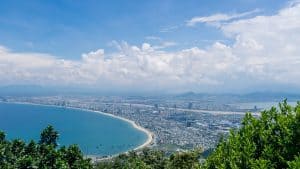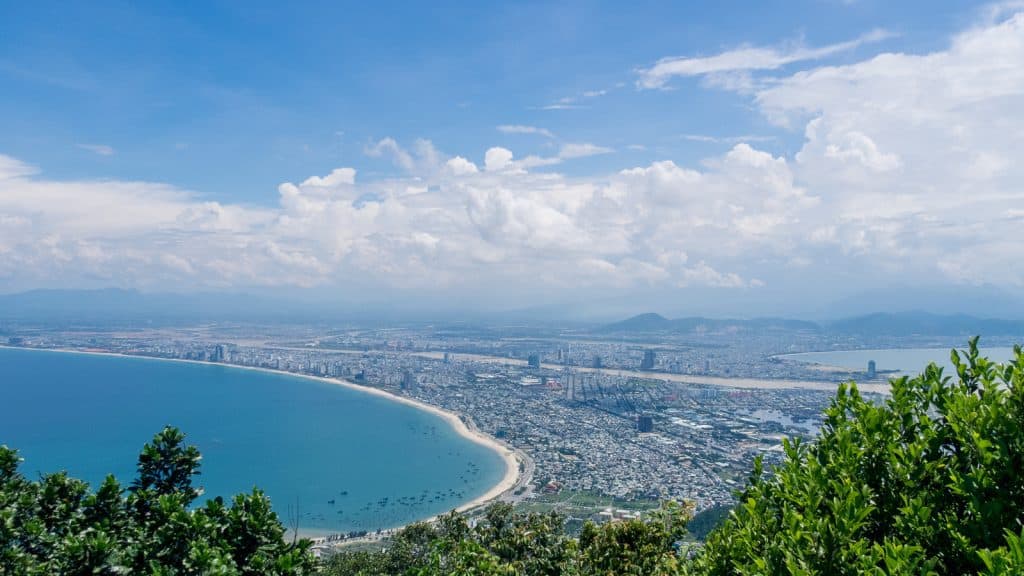After a month in Hoi An, I decided to stop for a few days in Da Nang, the city just 30 km North.
I took the public bus, which left every hour or so (there are not many fixed timetables for those local buses in Vietnam) only a few meters from my Hoi An accommodation, the Succulent Homestay, and arrived in downtown Da Nang 20,000 Dong ($1) and an hour later.
My accommodation of choice was the tiny Annam Hostel, only a few hundred meters from the Dragon Bridge. The owner and his staff not only had a few ideas for what to do in town, but they also organized a scooter for the day for me.
So, after three days of leisurely exploring Da Nang, here are some of my favorite things to do in town that would easily fit into a one-day itinerary.
Table of Contents
Da Nang Beach
The city boasts a long stretch of white sandy beach (the same stretch of sand that extends to the Hoi An beaches, only interrupted by the luxury resorts that have sprung up between the two cities).
You are sharing the beaches with plenty of fisher boats, and I didn’t see anyone offering loungers or sun shades.
If you follow the beach North, you’ll get to Son Tra peninsula (or Monkey Mountain).
Scooter tour on Son Tra Peninsula (Monkey Mountain)
At 120,000 Dong ($6) for the day, the motorcycle rental in Da Nangis slightly more expensive than in Hoi An.
I fill my tank at one of the gas stations along the beach boulevard and am on my way to the rocks covered with the dense jungle that are Son Tra peninsula (or Monkey Mountain).
Linh Ung Pagoda & Goddess of Mercy
Approaching Monkey Mountain along the beach from the South, the first thing you will notice is the massive white Lady Buddha statue looking out into the sea. The Goddess of Mercy is an impressive 67 m high, was built by the local fisherman, and watches over them when they head out for their dangerous work.
You can visit Linh Ung Pagoda and pay homage to the Lady Buddha.
Heritage Banyan Tree
But I have my eyes set on an older shrine. The heritage Banyan tree is an 800-year old ficus on the southeastern end of the peninsula.
The road to the tree, which is thankfully marked here and there, is a narrow lane built from concrete slabs. My bike is coping alright with the climbs and descends. But I’m not sure how I would have fared in a car.
The tree is everything I had hoped for and quietly becomes my favorite sight in Vietnam.
I don’t know how much you know about these Banyan trees, but they grow roots from their branches. Often, in the cities, these branch roots are cut before they reach the ground. Not at the Heritage tree.
Its crown spreads a good twenty meters in all directions and from the branches roots, some as thick as tree trunks, have firmly connected it to the ground.
I sit for a while in the cold shadow and marvel at Mother Nature’s creation.
The tree is not only a spiritual site but has also offered shelter to Vietnamese soldiers during the Vietnam War. It is fortunate that the US troops didn’t Agent Orange Son Tra.
Son Tra Lighthouse
After half an hour it is time to move on, and for lack of road ahead I head back to where I came from on the narrow line of concrete slabs. When I reach the intersection that could take me back to Linh Ung Pagoda, I choose the other direction instead. A faded sign points to a Tree Sanctuary.
At the far northeast end of the peninsula, I dirt path goes down an incredibly steep slope toward the sea. I am tempted to follow but doubt that my scooter would make it back up.
The dirt path would lead me to what some say is the World’s smallest Lighthouse, built in the 1950s by the French.
I pass the gate to what might be the Tree Sanctuary. I wouldn’t know as there is no sign and although the gate is open the path that follows looks far from inviting.
So I get back on the road, assuming it would take me around the peninsula.
But after the green encroaches in places and after a few rockfalls block half the road, the pavement simply ends in a wall of rock and shrubs.
Monkey Peak
So I turn back once more, pass the turnoff to the Heritage Tree and find another turn.
On the way, a few monkeys shift from leisurely strolling to chasing off into the undergrowth when they hear me come. Son Tra is home to the rare Red Shanked Doucs. But I can’t get close enough to tell.
The road takes me past the grand entrance to the InterContinenal Resort. One day…
After an hour, I reach the peak that gave Son Tra peninsula its English moniker: Monkey Mountain.
I park my bike for a few thousand Dong and climb the last few meters to the peak.
The view from here is stunning. To one side, I see the jungle, with a radar mast marking the highest point of the peninsula. To the other side, Da Nang is sprawling much further than I would have guessed from my walks through town.
I have the small picnic I brought (only cold drinks for sale here) and get back on my bike.
Secret Cove
Riding along the western side of the peninsula, my eyes spy a small cove below me. It looks like the perfect place for a swim and a refreshing coconut juice. But on the horizon, I also see menacing grey clouds growing by the minute.
Hot Springs
So I also pass the markers to a spring. Don’t want to caught in a storm here.
I have since tried to find more info on that spring online. To no avail. So if you get to Da Nang, make sure you bring some extra time and look out for the markers on the northern and Western side of the peninsula!
Dragon Bridge & Co.
I return to Da Nang from the Marine port side and manage one last quick stop before the heavens open.
I stop at the playful Dragon Bridge. A yellow metal dragon bends along its length. At night, the bridge is brightly illuminated, and on weekends in the summer you might even catch a few firework displays.
Pictures of Da Nang & Son Tra

Da Nang & Son Tra Logistics
- Packing for a day trip to Son Tra/Monkey Mountain:
- Download maps.me for navigation (the app is completely free, has very detailed maps, and allows for offline navigation).
- Make sure you protect yourself from the sun with sunscreen, long pants, and long sleeves, possibly even gloves. I wore shorts and t-shirt and burned massively.
- Bring food and water. Cold drinks are available at the Heritage Tree and Monkey Peak. But the only food I found was available at the InterContinental.
- Getting there/away:
- The main Vietnamese train line between Hanoi and Ho Chi Minh City passes through Da Nang. To me, the section between Da Nang and Hue is one of the most beautiful train rides I have ever been on. Tickets are available at the station (do allow for some hours for buying the tickets) or online, for example at Baolau.
- Numerous bus companies offer routes from/to Da Nang. Again, you’d best check in at Baolau or head for the bus station (on the western side of town)
- Da Nang has an airport, conveniently located almost in the city center. For tickets – you guessed it – I recommend checking Baolau
- Finally, the road between Da Nang and Hue is just as legendary as the train line. Renting a motorbike to cross Hai Van Pass is a favorite option (tough choice between this and the train). If you don’t dare ride yourself, look into so-called “Easy Rider” options where a professional driver will take you on the back of his motorcycle. Click here to read more about transport in Vietnam.
- Accommodation: I stayed at the Annam Hostel, which was a cheap and cheerful option with breakfast. Check Booking.com for other hotel or guesthouse options in Da Nang at the best price.
- Tours in Da Nang and Son Tra:
- You can book tours via your accommodation in Da Nang (or Hoi An).
- I found a couple of guided tours on Get Your Guide to give you an idea of what’s out there (see below).

